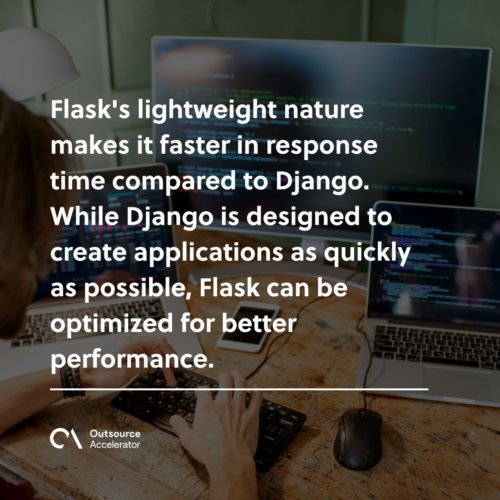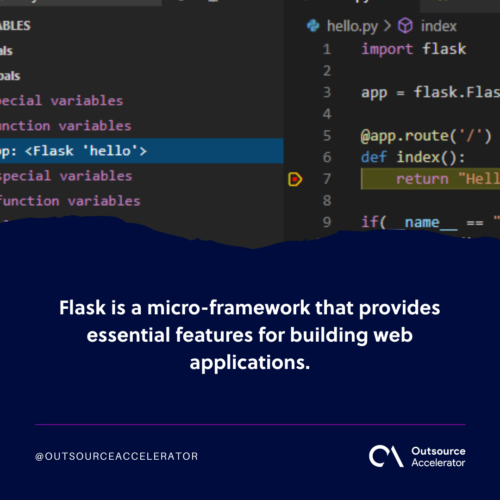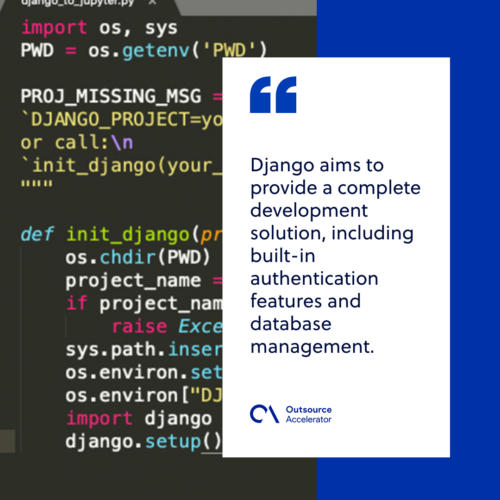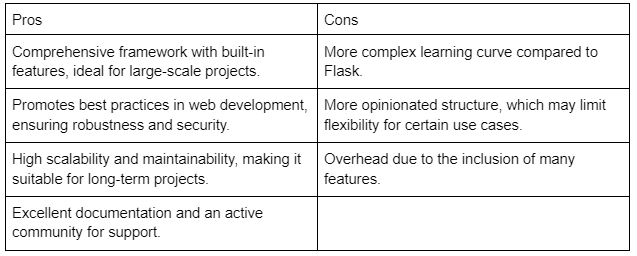Flask vs. Django: Which Python framework suits you?

Flask and Django are both popular Python frameworks used for web development. These have gained significance in the developer community for their robust features and ease of use.
While both are open-source frameworks, Django provides a full-stack solution with “batteries included,” while Flask is its more lightweight counterpart. Each has its appropriate use and purpose in software product development.
In this article, we will delve into the differences between Flask vs. Django and determine which framework best suits your web development needs.
What is Flask?
Flask is a micro-framework that provides essential features for building web applications.
It does not rely on external development libraries, though it only provides what is needed to develop a basic application. This allows developers to add or remove additional libraries per their requirements.
Flask is lightweight and follows a minimalist approach, making it an excellent choice for small to medium-sized projects.
Key features of Flask
Flask has the following essential features:
Minimalistic design
Flask is designed to be simple and lightweight, providing just the basic tools for web development. It allows developers to have more control over the project structure and architecture.
Flexibility
Flask allows developers to choose the components and libraries they want to include in their projects. It follows a “use only what you need” philosophy, allowing for a more tailored development experience.
It also adapts to different requests, supporting RESTful and HTTP formats.
Easy to learn
Some say that Flask is very Pythonic. It has a straightforward and intuitive syntax, making it easy for developers to learn and get started.
Its simplicity and minimalism contribute to its beginner-friendly nature.
Pros and cons of Flask
Flask offers several advantages as well as some limitations to consider.
What is Django?
On the other hand, Django is a full-featured framework that follows the model-view-controller (MVC) pattern. It aims to provide a complete development solution, including built-in authentication features and database management.
Django is often favored for large-scale projects with complex requirements.
Key features of Django
Compared to Flask, Django offers the following features:
Batteries included
Django comes bundled with a wide range of features and tools required for web development. It includes an object-relational mapping (ORM) for database management, an authentication system, and an admin interface.
This comprehensive approach allows developers to focus more on the application’s logic rather than setting up the groundwork.
Scalability and maintainability
Django’s structure and conventions make building and maintaining large-scale projects easier. Its powerful ORM simplifies database management and ensures consistency.
Django’s modular design also encourages code reusability, making it easier to scale and extend the application as needed.
Robust security
Django emphasizes cyber defense security and provides built-in protection against common web vulnerabilities.
It offers features like cross-site request forgery (CSRF) protection, SQL injection prevention, and secure password handling, which are crucial for developing secure web applications.
Pros and cons of Django
Here are the advantages and disadvantages of using Django.
Flask vs. Django: Comparing both frameworks
Given their features, advantages, and disadvantages, it is now easy to compare Flask and Django based on some key aspects.
Keep these pointers in mind should you decide to delegate your software development processes or have your in-house team.
Performance and speed
Flask’s lightweight nature makes it faster in response time compared to Django. While Django is designed to create applications as quickly as possible, Flask can be optimized for better performance.
On the other hand, Django’s comprehensive nature and included features give developers all they need to create a full system.
Project size and complexity
Flask is well-suited for small to medium-sized projects that require flexibility and a minimalist approach. Its simplicity allows developers to focus on specific requirements without unnecessary features.
Meanwhile, Django is more suitable for larger projects with complex requirements where maintainability and security are essential.
Learning curve
Flask’s simplicity makes learning and getting started easier, especially for beginners in web development. It allows developers to understand the core development concepts quickly.
While more complex, Django provides extensive documentation and resources. This helps experienced developers navigate the learning curve and become proficient with the framework.

Flask vs. Django: When to use the right framework
The choice between Flask vs. Django ultimately depends on the specific requirements of your project.
Use Flask if:
- You have a small to medium-sized project with minimal requirements.
- You prefer a flexible framework with more control on your part.
- You are a beginner in web development and want to start with an easier framework.
Use Django if:
- You are working on bigger web development projects.
- You need built-in features for authentication, database management, and admin interfaces.
- You prioritize scalability and maintainability.
Flask and Django are powerful Python frameworks with different advantages and uses. While you can maximize both frameworks on your project, it’s best to plan and analyze which will be best for your software project.











 Independent
Independent




